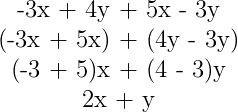Algebra is the foundation for all higher levels of math. In order to understand any mathematical field, you need to be able to speak algebra, which involves things like solving an equation, isolating the variable, and simplifying the expression.
What Is Basic Algebra?
Basic algebra is the field of mathematics that it one step more abstract than arithmetic. Remember that arithmetic is the manipulation of numbers through basic math functions. Algebra introduces a variable, which stands for an unknown number or can be substituted for an entire group of numbers. Arithmetic poses questions like 2 + 5 = ? Algebra, on the other hand, asks questions like: If x + 5 = 7, what is the value of x? Instead of immediately finding a basic sum, we have to do additional work to solve for an unknown.
Adding or Subtracting Like Terms
To add or subtract any terms in algebra, your terms must be like terms, which have the same variable and are raised to the same power. If you have like terms, you add or subtract the numbers attached to the variable, called the coefficients. The variable itself is unchanged. Let's look at an example:

In the first step, as you can see, we rearranged our terms to group them by like terms. After that, we rewrote the like terms to have just the coefficients inside parenthesis and the variable outside. This is not necessary, but it helps to show the math we completed in our final step to arrive at the answer of 2x + y.

